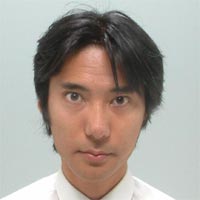Workshop on QUANTUM MEASUREMENTS AND OPERATIONS FOR CRIPTOGRAPHY AND INFORMATION PROCESSING
Quantum Measurements and Operations for Criptography and Information Processing
Lectures on Quantum Estimation and Information
>VITAE:
Masahito Hayashi was born in Japan in 1971.
He received Ph. D. degrees in Mathematics from Kyoto University, Japan,
in 1999.
In 2003, he joined Quantum Computation and Information Project, ERATO,
JST as the Research Head. He is an Editorial Board of International Journal
of Quantum Information. His research interests include quantum information
theory and quantum statistical inference.

Part I. Quantum Hypothesis Testing
and Discrimination of Quantum States
I.1 Two states Discrimination in Quantum System
I.2 Discrimination of Multi-Quantum States
I.3 Independent and Identical Condition in Quantum System
and Asymptotic Evaluation
I.4 Hypothesis Testing and Stein's Lemma
I.5 Hypothesis Testing by Separable Measurements
Part II. Quantum Information Geometry and Quantum
Estimation
II.1 Inner Products in Quantum System
II.2 Metrics induced Inner Products
II.3 Natural Coordinates and Torsion
II.4 Estimation of Quantum State
II.5 Large Deviation Evaluation
II.6 Multi-Parameter Estimation
Abstract of Part I.
In the quantum information, it is important issue to decide the unknown
state through appropriate measurement for the given finite samples of
the unknown state. If we a priori know that the unkown state belogs to
a given set consisting of finite elements, this problem is called discrimination
of quantum states.
On the other hand, when we check the hypothesis for the given unknown
state, this problem is called Quantum Hypothesis Testing. In this talk,
we treat a quantum version of Chernoff lemma which gives the optimal error
rate for the two state discrimination.
We also treat a quantum version of Stein's lemma which gives the optimal
second error rate for constant condition for first error probability in
the two (simple) state hypothesis testing.
Abstract of Part II.
When the hypothesis of the unknown state is given as a parameteric set,
the above decision problem is called state estimation.
In this talk, I will treat the relation between quantum state estimation
and geometry of quantum states.
For this purpose, I will summarize several basic facts on geometry of
quantum states. After it, I will mention several fundamental results concerning
state estimation.
In particular, I can consider several settings concerning restriction
of measurement for this estimation. I also compare the optimal estimation
errors under the respective restrictions.